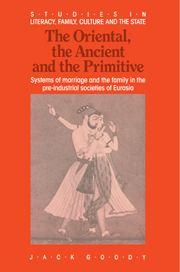 The Oriental, the Ancient and the Primitive
The Oriental, the Ancient and the Primitive PART IV - GREECE AND ROME, YESTERDAY AND TODAY
Published online by Cambridge University Press: 09 January 2010
Summary
The history as distinct from the prehistory of Europe effectively begins with the advent of writing in Greece, continues with the development of the Roman Empire and then with the coming of Christianity diverges into the tradition of the Western Church based in Rome and the Eastern Church based in Constantinople. In my analysis of the development of marriage and the family in Europe (1983), mainly medieval Europe, I discussed some aspects of the inheritance from Rome. Both Rome and Greece had important influences on the social life of the Near East, of Egypt, Israel and the Arab world. In the next section I want first to consider the situation in ancient Greece, then in ancient Rome, finally returning to the subsequent history of marriage and the family in the Eastern Mediterranean in order to provide a link with the structure of domestic relations in rural Europe in pre-industrial times. In this way I hope to draw together some of the threads that bind societies in the Far and Near East, between East Asia on the one hand and the Mediterranean world on the other, to indicate some of the points of similarity between the structures of kinship, marriage and the family in the major societies of Asia and Europe.
In discussing Greece and Rome I will take the same approach as in the previous section where I have tried to bring out some of the changes that have taken place in the understanding of Western scholars regarding marriage, endowment and lineage in these societies.
- Type
- Chapter
- Information
- The Oriental, the Ancient and the PrimitiveSystems of Marriage and the Family in the Pre-Industrial Societies of Eurasia, pp. 383 - 385Publisher: Cambridge University PressPrint publication year: 1990


